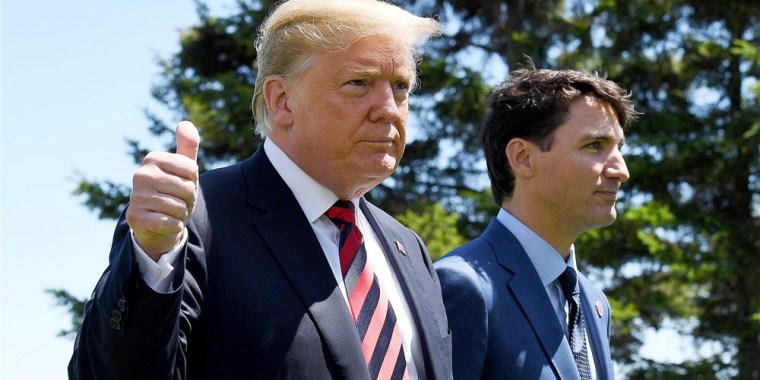Donald Trump has long opposed NAFTA for reasons he's struggled to explain, and the American president made it a priority to renegotiate the terms of the existing trade deal with our Canadian and Mexican partners. The deadline for an agreement was last night, and it looks like the deal is done.
The United States and Canada reached a deal on Sunday to salvage NAFTA as a trilateral pact with Mexico, beating a midnight deadline with agreements to substantially boost American access to Canada's dairy market and protect Canada from possible U.S. auto tariffs, sources with direct knowledge of the talks said.
The agreement now heads to Congress, where its future is uncertain.
As expected, the new NAFTA includes an extensive list of provisions, but it does not appear to be a dramatic overhaul. The New Republic's Jeet Heer explained that the new agreement "is only a minor shift from the status quo," adding that the changes are "mostly cosmetic."
The major victory for the Trump administration is that the Canadian market will be opened up for more American dairy products. But, as The New York Times notes, this opening “is similar to what the United States would have gained through the Trans-Pacific Partnership, a trade treaty that President Trump withdrew from last year.” Under the new agreement, the United States would now have access to 3.6% of Canada’s dairy market (TPP would’ve opened up 3.25% of the dairy market). In other words, the most significant concession Canada made was only slightly larger than what it had already been prepared to make.
The New York Times' Paul Krugman added, "My original prediction on Trump/NAFTA was that we would end up making some minor changes to the agreement, Trump would declare victory, and we'd move on. That's what seems to have happened."
But there was one significant change to the status quo, which speaks volumes about Donald Trump's odd approach to policymaking: it has a new name, which is more interesting than you'd probably expect.
The American president was determined to "rebrand" NAFTA, not to change its core provisions. To that end, the new NAFTA, at the White House's insistence, will now be called USMCA -- for "U.S.-Mexico-Canada Agreement -- which is vastly more difficult to say.
Nevertheless, the name change was a "non-negotiable" demand from the Trump administration's delegation. Trump wanted a new NAFTA deal, and he was heavily invested in the idea that NAFTA needed a new name.
Which brings us to an eerily familiar point: this president may not care much about public policy, but Trump cares deeply about what public policies are called.
As we discussed in March, for example, the Republican criticized community colleges during remarks in Ohio, not because he's concerned about the institutions themselves, but because of the title.
"I don't know what that means, a 'community college'," Trump said at the time. "Call it 'vocational and technical.' People know what that means. They don't know what a community college means." (The fact that community colleges are not always the same thing as vocational and technical colleges was apparently unimportant.)
A month earlier, the president said he wanted “comprehensive” gun reforms, not because of his support for a variety of new measures, but because he likes the word “comprehensive.” Before that, during the debate over tax policy, Trump was quite enthusiastic about the name of the legislation (he preferred the “Cut Cut Cut Bill”), even if he was fuzzy about the substantive details.
As regular readers may recall, around the same time, Trump referenced something called a border adjustment tax, which some GOP leaders intended to use to help pay for their tax package. “Anytime I hear ‘border adjustment,’ I don’t love it,” the president said.
That led many to believe the White House was, at best, skeptical of the idea, but that wasn’t quite right. Trump was being literal: when he heard the words “border adjustment,” he didn’t like it, not because he doubted the policy on the merits, but because he wasn’t comfortable with the phrase itself.
The same is true on immigration: the president has been at his most animated when making the case against using the word “Dreamers” – not on policy grounds, but because he worries that the word itself has a public relations potency.
The problem even arose during the health care fight. At one point in early March, Trump and House Speaker Paul Ryan spoke about the GOP’s proposal, and the president said he had had a problem: Ryan had used the word “buckets” to describe the additional steps of reform that would follow the initial legislation. “I don’t like that word buckets,” Trump reportedly said, preferring “phases.”
The House Speaker obliged, but the anecdote was telling. Trump’s focus was on branding and sales pitches, not substance. As the NAFTA process helped make clear, this hasn’t changed.
Last year, Trump boasted at a meeting with business leaders, “I’m good at branding.” That may be true, but is he good at anything else?
